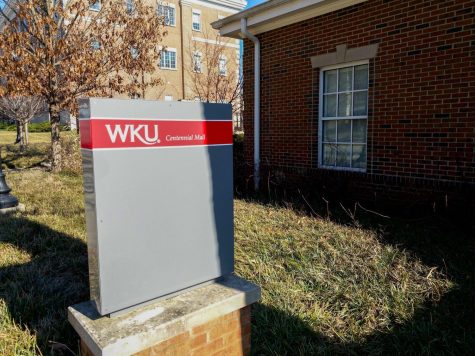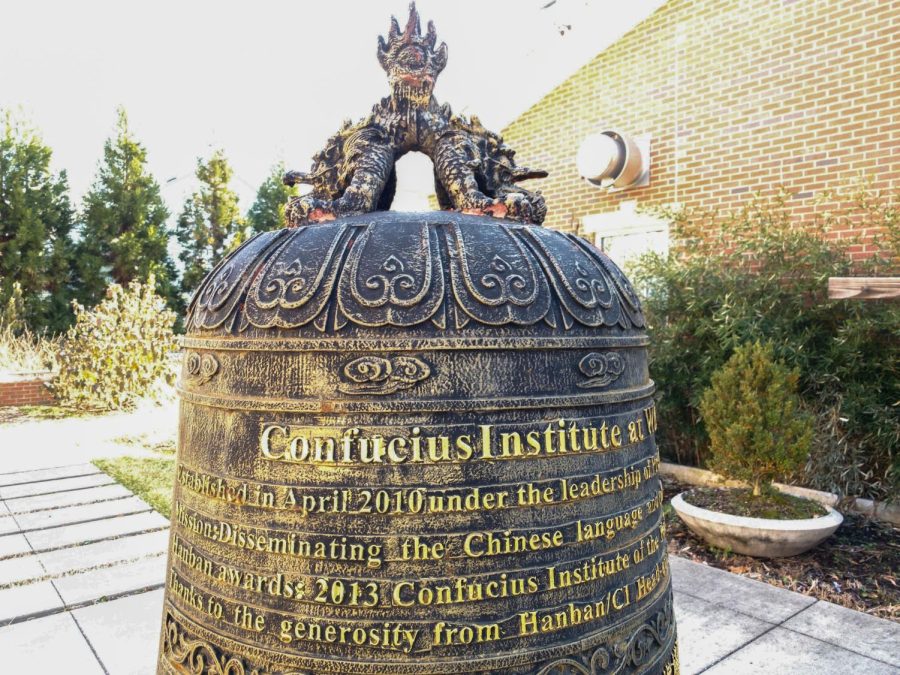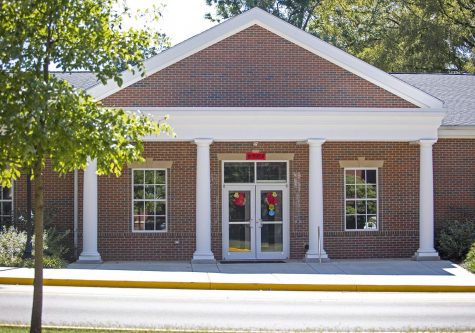WKU in litigation over closure of Confucius Institute
February 11, 2022
Walking down Normal Street, WKU students pass the Helm-Cravens library, Munday Hall, the Mahurin Honors College and the Adams-Whitaker Student Publications Building. Students also pass the neglected building that once housed the Confucius Institute.
The building has no writing on its gray street marker to designate it as the former Confucius Institute, unlike its neighboring structures. Weeds and overgrowth in the surrounding garden show the disuse the building has endured since the program ended three years ago.
In 2019, WKU announced that it would end its partnership with the Confucius Institution for the foreseeable future in accordance with the National Defense Authorization Act of 2019. This came after Christopher Wray, director of the FBI, shared with a Senate panel in February 2018 his concerns that the program posed a threat to national security.
The act “prohibited the use of Defense Department funding for Chinese language instruction provided by the Confucius Institute” and defined the program as “an institute that is operated by the Office of Chinese Language Council International…which is affiliated with the Ministry of Education of the People’s Republic of China.”
WKU attempted to obtain a waiver to keep the institute open, but was denied by the U.S. Department of Defense.
This termination led the Center for Language Education and Cooperation to file legal action against the university, according to a summons dated Dec. 20, 2021.
In the civil summon obtained by the Herald, the CLEC is filing for the amount of $3,224,720 million as of June 6, 2021, with an additional penalty of $1,864 per day it isn’t paid.
“By contract, the payment of such amount by WKU to CIH was due 45 days after termination, June 6, 2019,” the summons states. “In addition, contract penalties began to accrue by that date. Those penalties were one-tenth of one percent of contract damages, or $1,864 per day. Despite demands for such payment, WKU has refused to make payment.”
Due to the current litigation with CLEC, WKU declined to comment on whether the university owned the building.
The Confucius Institute operated at WKU for just under two years, far less than the required 50 years dictated by the site agreement.
“WKU agreed to use the Construction Funds to construct a building to house the Confucius Institute on campus and to operate a Confucius Institute in the completed building for a term of at least 50 years,” the summons states.
However, according to a document obtained by the Herald, the university is attempting to obtain a dismissal claiming that changes in federal law renders the agreements void.
“Plaintiff’s claims are of course meritless, as even Plaintiff acknowledges that a change in federal law—namely, the enactment of the National Defense Authorization Act of 2019 (“NDAA”)—rendered performance of these agreements impossible and impracticable and caused the parties to be released from their obligations thereunder,” the case document states.
WKU is not the only university to close their Confucius Institute. At least 10 other universities have closed their program citing “academic freedom and institutional autonomy, Chinese State censorship” and other political concerns.
The closure of the institute was met with mixed feelings from WKU students, but many were pleased the Chinese Flagship Program was still allowed to continue.
“I think it’s unfortunate that we found ourselves in a place where that sort of decision had to be made, but as a Flagship student who has really enjoyed the program here, I’m excited that the Flagship will continue moving forward,” Lucas Knight, a former WKU student in the Chinese Flagship Program and SGA senator, said at the time.
According to Andrea Anderson, WKU’s general counsel, the university does not have any current plans to repurpose the building.
However, the university’s Campus Master Plan, which lays out future building projects on the Hill over the next decade, designates the Institute’s building as part of “potential new building sites or parking expansion” in a section focused on projects beyond 2031.
It is unclear what will happen to the institute’s building in the future. For now, it remains in limbo.

What is the Confucius Institute?
The Center for Language Education and Cooperation is a “non-profit professional educational institution for international Chinese language education.” The center is also an agency of the Chinese government’s Ministry of Education.
The Confucius Institute rapidly spread in the United States after the opening of the first location in 2004 at the University of Maryland. At the program’s height in popularity, it had roughly 90 locations.
The Confucius Institute Headquarters is now supported by the Chinese International Education Foundation, a non-governmental agency, but is housed by several universities throughout the world.
“Each [Confucius Institute] opened around the world is operated by a local affiliate college or university, with financial support from CIEF and sister Chinese universities,” the civil summons states.
WKU’s History with the Confucius Institute
Negotiations were conducted between 2009-2010 concerning the establishment of a Confucius Institute which led to a series of agreements.
The first of these agreements, called the “CI WKU Establishment Agreement”, was signed on Feb. 8, 2010. The agreement established the terms for funding, area for construction, personnel and teaching materials.
“In order to strengthen educational cooperation between China and the United States, support and promote the development of Chinese language education, and increase mutual understanding among people in China and in the United States,” the preamble of the first agreement states.
The agreement mentions that the university was to operate the institute independently.
The second agreement, called the Site Agreement, was signed by WKU on Dec. 8, 2014, and agreed on the construction of the facility on campus, built by the university and to be dedicated as the “Model Confucius Institute at Western Kentucky University.”
The Site Agreement set terms for the Confucius Institute Headquarters to provide $1.5 million for the construction of the building on Normal Street. The building which resulted from the agreement was to be used for no less than 50 years.
The following year, the agreement was amended in a Supplemental Agreement stating that the Confucius Institute Headquarters pay an additional $500,000 to go toward the construction.
The CLEC fulfilled its funding obligations and the Confucius Institute began operations on WKU’s campus in 2017.
News reporter Michael Crimmins can be reached at [email protected]. Follow him on Twitter @michael_crimm




























